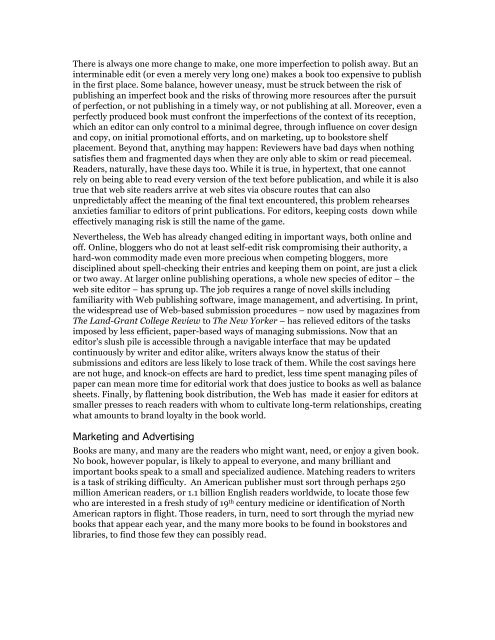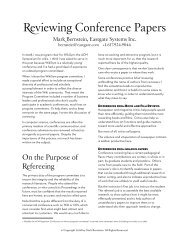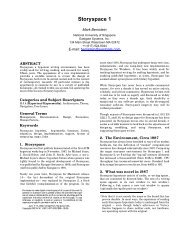Genre: Designing a New Media Economy - Mark Bernstein
Genre: Designing a New Media Economy - Mark Bernstein
Genre: Designing a New Media Economy - Mark Bernstein
Create successful ePaper yourself
Turn your PDF publications into a flip-book with our unique Google optimized e-Paper software.
There is always one more change to make, one more imperfection to polish away. But aninterminable edit (or even a merely very long one) makes a book too expensive to publishin the first place. Some balance, however uneasy, must be struck between the risk ofpublishing an imperfect book and the risks of throwing more resources after the pursuitof perfection, or not publishing in a timely way, or not publishing at all. Moreover, even aperfectly produced book must confront the imperfections of the context of its reception,which an editor can only control to a minimal degree, through influence on cover designand copy, on initial promotional efforts, and on marketing, up to bookstore shelfplacement. Beyond that, anything may happen: Reviewers have bad days when nothingsatisfies them and fragmented days when they are only able to skim or read piecemeal.Readers, naturally, have these days too. While it is true, in hypertext, that one cannotrely on being able to read every version of the text before publication, and while it is alsotrue that web site readers arrive at web sites via obscure routes that can alsounpredictably affect the meaning of the final text encountered, this problem rehearsesanxieties familiar to editors of print publications. For editors, keeping costs down whileeffectively managing risk is still the name of the game.Nevertheless, the Web has already changed editing in important ways, both online andoff. Online, bloggers who do not at least self-edit risk compromising their authority, ahard-won commodity made even more precious when competing bloggers, moredisciplined about spell-checking their entries and keeping them on point, are just a clickor two away. At larger online publishing operations, a whole new species of editor – theweb site editor – has sprung up. The job requires a range of novel skills includingfamiliarity with Web publishing software, image management, and advertising. In print,the widespread use of Web-based submission procedures – now used by magazines fromThe Land-Grant College Review to The <strong>New</strong> Yorker – has relieved editors of the tasksimposed by less efficient, paper-based ways of managing submissions. Now that aneditor's slush pile is accessible through a navigable interface that may be updatedcontinuously by writer and editor alike, writers always know the status of theirsubmissions and editors are less likely to lose track of them. While the cost savings hereare not huge, and knock-on effects are hard to predict, less time spent managing piles ofpaper can mean more time for editorial work that does justice to books as well as balancesheets. Finally, by flattening book distribution, the Web has made it easier for editors atsmaller presses to reach readers with whom to cultivate long-term relationships, creatingwhat amounts to brand loyalty in the book world.<strong>Mark</strong>eting and AdvertisingBooks are many, and many are the readers who might want, need, or enjoy a given book.No book, however popular, is likely to appeal to everyone, and many brilliant andimportant books speak to a small and specialized audience. Matching readers to writersis a task of striking difficulty. An American publisher must sort through perhaps 250million American readers, or 1.1 billion English readers worldwide, to locate those fewwho are interested in a fresh study of 19 th century medicine or identification of NorthAmerican raptors in flight. Those readers, in turn, need to sort through the myriad newbooks that appear each year, and the many more books to be found in bookstores andlibraries, to find those few they can possibly read.




